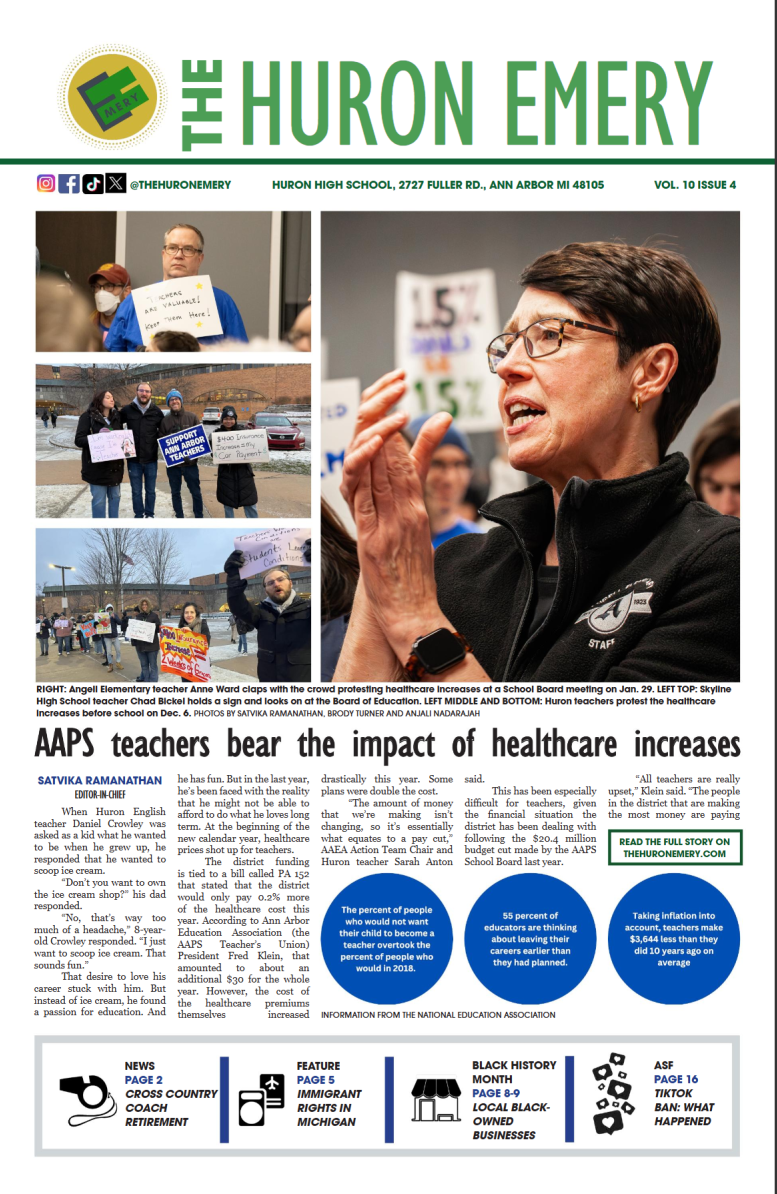Unwrapping the stigma: Addressing period poverty
As of 2021, 23 percent of students have struggled to find period products, according to period.org.
January 16, 2022
Approximately, one in five Americans miss school due to lack of access to period products. 3.5 million women get their period every month. 500 million do not have access to menstrual or feminine products, experiencing period poverty.
On Nov. 1, the Ann Arbor City Council voted unanimously on providing menstrual/sanitation products in all public restrooms of Ann Arbor (without regard to gender designation and without charge).
“It’s terrible when people don’t have access to [menstrual products],” Ann Arbor Mayor Christopher Taylor said. “ The absence of period products inhibits people at work, inhibits people at school and inhibits their ability to engage in basic life. It keeps people from achieving what they can and being easy participants in society.”
Taylor first became aware of this inequity when a high school student approached him and voiced her concerns. Those concerns were that it was difficult for many to obtain for those who did not have established residences.
“Over time, I’ve heard reports that various jurisdictions are making them available in schools,” Taylor said. “I didn’t quite figure how we could do that. But over time, it put a bug in my ear as to the importance of the issue, and we’re able to roll out a citywide policy.”
Starting Jan. 1, 2022, the ordinance will come into effect, making Ann Arbor the first U.S. city to do so.
“It’s a fundamental human need,” Taylor said. “A fundamental public health need, in a matter of personal dignity that these products be available. I’m just so glad that we’re able to ensure that they are. I’m hoping that we can do our part to overcome that and hoping that we can do our part to support people’s engagement in the community, engagement in school, engagement in work and engagement in going about doing things in the regular. Having the products available is going to play a big role in people’s lives.”
In the ordinance process, United States and city governments have to have the ability to set rules, before they move forward. As well as having valid reasons as to why they would want to pass it.
“Sometimes that rational basis and as a matter of constitutional scrutiny,” Taylor said. “The rule has to have a rational basis, and it has to express be within the government’s ordinary power to achieve that goal. With respect to menstrual products, we do not have the ability to pass a rule about the distribution of menstrual products merely because we think it’s good or equitable, or people should be able to afford them. That’s not something that we can do.”
Instead, the ordinance establishes a sanitation criteria as cities do have the ability to set rules affecting health, safety and welfare.
“Leaning on that health support we have an ability to make rules with respect to sanitation,” Taylor said. “We have rules with respect to the storage of solid waste and where you put it and how you dispose of it. We have rules that we at the county affects, restaurant inspections and the likes of governments have the ability to promote sanitation and public health. Menstrual products fall within that category. They aren’t there to promote sanitation. They promote public health.”
Any violations of the ordinance results in a $100 fine and as the ordinance states, “community Standards officers shall be responsible for enforcing this section.”
“We’re not going to have a set of bathroom inspectors running around different buildings checking to see this,” Taylor said. “We communicate to people their obligations, we expect them to comply with their obligations. In the event that folks are not complying with their obligations, we expect the some member of the public to communicate to the bathroom provider head or tampons. I would hope that that person would call to the city and our community standards officers would go out and inform the provider. We’re not looking to levy fines or anybody I’m thinking on folks if we can avoid it — our goal is education through normative pressure and education.”
A poll from menstrual hygiene days found that 58 percent of women “felt an embarrassment simply because they were on their period.”
Senior Durva Chavarkar just told her mom she was on her period in India. Right as the words came out of her mouth, her cousin and grandparents stopped what they were doing, furrowed their brows and just stared strangely.
“You can not be talking about that out in the open,” they demanded her.
“I tried talking about it more,” Chavarkar said. “They did not really want to because they thought it would be weird to discuss something like getting your period. When I was younger, I definitely noticed it being a big thing. It was very ‘hush, hush’ for something that’s so normal. That’s something that happens to everyone and it shouldn’t be something you have to be quiet about.”
Chavarkar’s parents and her talk very freely about menstrual cycles and she had been in an environment where she was encouraged to talk about her period.
“I’m proud to say my parents are open but I have definitely seen it with my friends and even I held a stigma as well in asking for a pad or tampon.”
Eventually, Chavarkar built up the courage and overcame the stigma by normalizing it and having conversations.
“It’s unfortunate there is a stigma,” Chavarkar said. “I think steps are taken to lessen the stigma like Ann Arbor becoming the first city to include period products in restrooms. That’s such a big step forward, and it’s so amazing. It’s going to take time just like everything else.”
However, the ordinance will not be covering the University of Michigan.
“My main vision was for the tampon tax to be repealed and for period poverty in Michigan and elsewhere to be lessened, “ University of Michigan Ross student Mythily Lokam said. “Though the former is effective, period poverty is still very real. Washtenaw County is an incredibly economically segregated place and it’s disappointing that the University of Michigan isn’t doing what it can to be more inclusive and equitable to students and faculty. If the foremost academic institution in the area does not adopt the ordinance, I do not see how other cities will be inspired to follow in Ann Arbor’s footsteps.”
Lokam previously was a board member of Washtenaw International High School’s chapter of Project Period and a current board member of the University of Michigan Dot Org Advocacy Team.
“It’s kind of stupid that’s not gonna cover university students,” Chavarkar said. “Students in University a are some of the people who need resources the most, especially with how much they have to pay for just their education — it shouldn’t be something to pay for as well. It shouldn’t be limited to who it’s for.”
Taylor says that he believes this ordinance will cover Ann Arbor Public Schools. In fact, he had a brief conversation with Superintendent Jeanice Swift when he was drafting the proposal this summer and spring.
“I leave that to the lawyers,” Taylor said. “Dr. Swift expressed her full support, indicating that she thought that was a right and proper thing to do. So I would expect schools to be moving in that direction.”
Art teacher Kristin Kubacki had been keeping menstrual products in her room for about four years.
“I just know that it’s a struggle for kids who get caught unaware,” Kubacki said. “They would have to go to the nurse or find a friend and it just creates stress and struggle in their lives. I just figured we just have them out — easily accessible, easy to grab, then it would just take one small stressor away from students.”
Kubacki is glad that with the ordinance there is a more structural level to Ann Arbor with the ordinance.
“[Menstrual products] are a basic human need,” Kubacki said. “The fact that it’s not seen that way is really, really frustrating. These have been taxed as luxury items, that they’re not readily available like you know, we don’t have to pay in public restrooms to use toilet paper or soap or paper towels, those things are provided because of their basic human needs. I just feel like it’s logical that this would also be part of that.”
Kubacki encourages everyone to normalize making menstrual products accessible and
“It’s good for everyone to see this is just a natural normal part of our bodies,” Kubacki said. “We don’t need to be embarrassed about it. There shouldn’t be a stigma about it. If you need a tissue, you grab a tissue. If you need a tampon, you grab a tampon, and I just wish it could be as normal as that.”
Taylor finds that the impact of COVID-19 is minimal and encourages other cities and states to obligate these products to be available especially in restaurants.
“It’s not a particularly heavy cost upon the restaurant provider,” Taylor said. “It is a substantial benefit to people that ministry ministration is it’s basic to basic human function and in order to be recognized as such and supported. There’s a fair bit of momentum behind things like removing the pink tax,” Taylor said. “This is the next step, where they’re going to be available throughout their jurisdiction. I’m hoping that, as other cities see what we’re up to in the media they will have a spark of the imagination a spark of well if they could do it, we could do it, and soon, I hope it’ll be something that is it’s commonplace instead of unusual.”
So, why did it take so long?
“It took so long for me because I just I didn’t put two and two together,” Taylor said.” After the student came to me with this idea, I didn’t make the next step in my mind [which was], ‘Well, maybe this is something that we can we can ourselves obligate.’ I didn’t make that step particularly quickly.
After observing Scotland making period products free, Taylor started thinking on how he can approach the ordinance as the public health department is at the county level and the city doesn’t have very much public health activity. So the council does not take much part in it.
“It’s not really it’s up often in my mind space,” Taylor said. “Because we don’t have public health staff generally speaking. And so, you know, I just, I myself didn’t think about it. I wish I had. It took so long structurally because men do not menstruate. If men menstruated, it would have been done years ago.”














